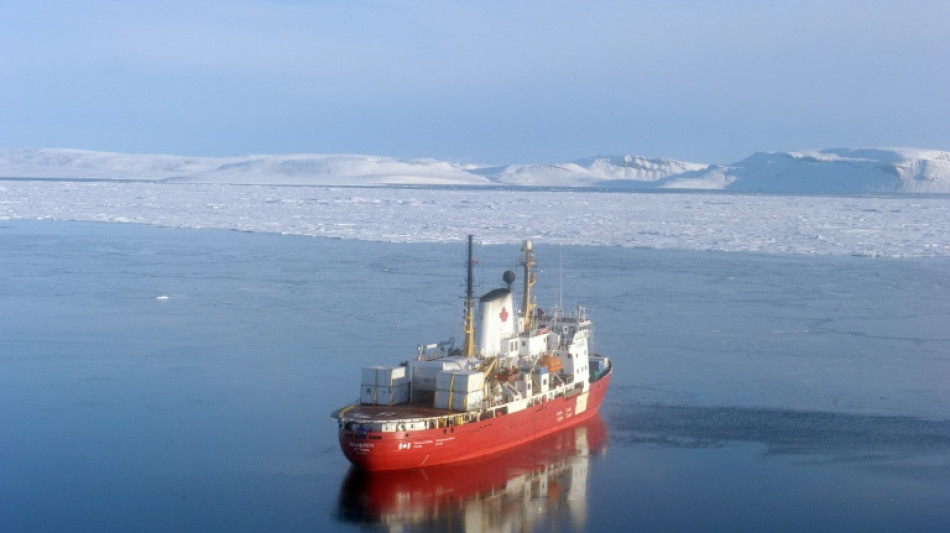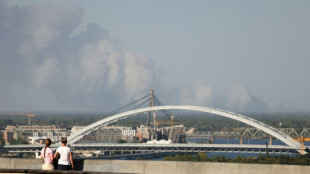
-
 Breyten Breytenbach, writer who challenged apartheid, dies at 85
Breyten Breytenbach, writer who challenged apartheid, dies at 85
-
Tuipulotu try helps Scotland end Australia's bid for Grand Slam

-
 Truce called after 82 killed in Pakistan sectarian clashes
Truce called after 82 killed in Pakistan sectarian clashes
-
Salah wants Liverpool to pile on misery for Man City after sinking Saints

-
 Berrettini takes Italy to brink of Davis Cup defence
Berrettini takes Italy to brink of Davis Cup defence
-
Lille condemn Sampaoli to defeat on Rennes debut

-
 Basel backs splashing the bucks to host Eurovision
Basel backs splashing the bucks to host Eurovision
-
Leicester sack manager Steve Cooper

-
 IPL auction records tumble as Pant, Iyer break $3 mn mark
IPL auction records tumble as Pant, Iyer break $3 mn mark
-
Salah sends Liverpool eight points clear after Southampton scare

-
 Key Trump pick calls for end to escalation in Ukraine
Key Trump pick calls for end to escalation in Ukraine
-
Tuipulotu try helps Scotland end Australia's bid for a Grand Slam

-
 Davis Cup organisers hit back at critics of Nadal retirement ceremony
Davis Cup organisers hit back at critics of Nadal retirement ceremony
-
Noel in a 'league of his own' as he wins Gurgl slalom

-
 A dip or deeper decline? Guardiola seeks response to Man City slump
A dip or deeper decline? Guardiola seeks response to Man City slump
-
Germany goes nuts for viral pistachio chocolate

-
 EU urges immediate halt to Israel-Hezbollah war
EU urges immediate halt to Israel-Hezbollah war
-
Far right targets breakthrough in Romania presidential vote

-
 Basel votes to stump up bucks to host Eurovision
Basel votes to stump up bucks to host Eurovision
-
Ukraine shows fragments of new Russian missile after 'Oreshnik' strike

-
 IPL auction records tumble as Pant and Iyer snapped up
IPL auction records tumble as Pant and Iyer snapped up
-
Six face trial in Paris for blackmailing Paul Pogba

-
 Olympic champion An wins China crown in style
Olympic champion An wins China crown in style
-
It's party time for Las Vegas victor Russell on 'dream weekend'

-
 Former Masters champion Reed seals dominant Hong Kong Open win
Former Masters champion Reed seals dominant Hong Kong Open win
-
Norris applauds 'deserved' champion Verstappen

-
 Jaiswal and Kohli slam centuries as Australia stare at defeat
Jaiswal and Kohli slam centuries as Australia stare at defeat
-
Kohli blasts century as India declare against Australia

-
 Verstappen 'never thought' he'd win four world titles
Verstappen 'never thought' he'd win four world titles
-
Former Masters champion Reed wins Hong Kong Open

-
 Awesome foursomes: Formula One's exclusive club of four-time world champions
Awesome foursomes: Formula One's exclusive club of four-time world champions
-
Smylie beats 'idol' Cameron Smith to win Australian PGA Championship

-
 Five key races in Max Verstappen's 2024 title season
Five key races in Max Verstappen's 2024 title season
-
Max Verstappen: Young, gifted and single-minded four-time F1 champion

-
 'Star is born': From homeless to Test hero for India's Jaiswal
'Star is born': From homeless to Test hero for India's Jaiswal
-
Verstappen wins fourth consecutive Formula One world title

-
 Survivors, sniffing dogs join anti-mine march at Cambodia's Angkor Wat
Survivors, sniffing dogs join anti-mine march at Cambodia's Angkor Wat
-
Far right eye breakthrough in Romania presidential vote

-
 Jaiswal slams majestic 161 but Australia fight back in Perth
Jaiswal slams majestic 161 but Australia fight back in Perth
-
Edinburgh's alternative tour guides show 'more real' side of city

-
 IPL teams set to splash the cash at 'mega-auction' in Saudi Arabia
IPL teams set to splash the cash at 'mega-auction' in Saudi Arabia
-
Olympics in India a 'dream' facing many hurdles

-
 Wounded Bangladesh protesters receive robotic helping hand
Wounded Bangladesh protesters receive robotic helping hand
-
Majestic Jaiswal 141 not out as India pile pain on Australia

-
 Giannis, Lillard lead Bucks over Hornets as Spurs beat Warriors
Giannis, Lillard lead Bucks over Hornets as Spurs beat Warriors
-
Juan Mata agent slammed as 'cowardly' by angry A-League coach

-
 Marta inspires Orlando Pride to NWSL title
Marta inspires Orlando Pride to NWSL title
-
Palestinian pottery sees revival in war-ravaged Gaza

-
 Main points of the $300 billion climate deal
Main points of the $300 billion climate deal
-
Robertson wants policy change for overseas-based All Blacks


Melting ice no guarantee of smooth sailing in fabled Arctic crossing: study
Melting sea ice in the fast-warming Arctic Ocean is not making it easier for sailors to navigate a legendary shortcut between Europe and Asia despite popular belief, scientists said Thursday.
To the contrary, climate change was causing thicker, more hazardous ice to choke the fabled "northwest passage" long-sought by navigators seeking a faster route from the Pacific to the Atlantic Oceans.
Considered virtually impassable a century ago, a growing number of ships have been sailing this remote seaway north of Canada as the thawing of the polar ice promised new opportunities for trade and exploration.
Cargo ships, fishing boats, racing craft and even a large, 1,000-passenger cruise liner were among the vessels to make the once-unthinkable voyage in recent years.
But a new study challenges "the increasingly common belief" that the northwest passage could become a viable alternative shipping route as warming temperatures cause an overall decline in Arctic sea ice.
"We found almost the opposite of what people were assuming," the study's lead author Alison Cook, an expert on polar shipping at the Scottish Association for Marine Science, told AFP.
Far from opening up, Cook and colleagues found that the shipping season in the northwest passage -- the number of weeks per year that a vessel can safely navigate -- actually shortened between 2007 and 2021.
This was the result of an increase in older, thicker ice from the melting polar cap drifting southward into the passage, where it reinforced choke points and impeded navigation.
This ice posed a greater risk to ships than the younger, thinner ice more common in the Canadian archipelago, said the study published in the journal Communications Earth and Environment.
- Storied route -
Explorers dreamt for centuries of discovering a northwest passage through the Arctic.
In one of the Arctic's great mysteries, British explorer Sir John Franklin led a storied expedition to chart the course in 1845 that cost two ships and the lives of all aboard.
In 1906, Roald Amundsen became the first European to sail its icy distance.
The journey saves ships approximately 7,000 kilometres (4,300 miles) of distance between Europe and Asia.
As sea ice has considerably declined in the Arctic, the prospect of reshaping global trade flows has renewed geopolitical and economic interest in the storied route.
But the lack of infrastructure, its remoteness, and maze-like shoals and straits make navigation perilous.
The study said that as sea ice has declined, the number of voyages across the entire Canadian Arctic had quadrupled since 1990.
Journeys through the northwest passage have grown too, but remain very low.
Ships entering its straits increased from 112 in 2013 to 160 in 2019, according to the Arctic Council, an intergovernmental organisation for the region.
This could change as the planet further warms.
A 2021 peer-reviewed study forecast that the northwest passage would be navigable for at least part of the year if global temperatures rose 2 degrees Celsius above pre-industrial levels.
This latest study did not offer future projections but Cook said the older, thicker ice accumulating in the passage would be there "for quite some time, many years into the future".
"It's more like giving a warning," she said of their findings, "or making people aware (to be) careful still, because it's not opening up anytime soon."
F.Pavlenko--BTB



